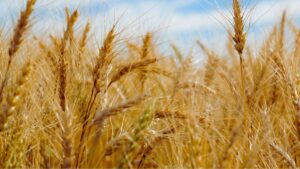 In a major breakthrough for sustainable agriculture researchers at Western Sydney University have discovered that wheat plants under drought stress can recruit helpful soil microbes to survive a finding that could revolutionise crop resilience in the face of climate change.
In a major breakthrough for sustainable agriculture researchers at Western Sydney University have discovered that wheat plants under drought stress can recruit helpful soil microbes to survive a finding that could revolutionise crop resilience in the face of climate change.
Nature’s SOS: Microbial Allies Beneath Our Feet
The study, published in the prestigious journal Cell Host & Microbe, reveals that drought-hit wheat plants secrete a compound called 4-oxoproline through their roots. This acts like a chemical distress signal, attracting beneficial soil bacteria particularly Streptomyces and Leifsonia to their root zones.
Once in place, these “drought-fighting” microbes respond by producing osmolytes, plant hormones, and nutrient solubilisers. Together, these help wheat plants retain moisture, continue growing, and maintain health even in dry conditions.
Reintroducing these microbes into drought-stressed wheat fields had dramatic effects: crops grew larger, stayed healthier, and produced more grain. Remarkably, the benefits extended into the next generation of crops a phenomenon scientists call “drought memory.”
This research shows how plants and soil bacteria team up to survive stress. It’s a natural, eco-friendly strategy that could help farmers adapt to climate change without chemical inputs.
From Soil to Solution: Farming’s New Bio-Based Toolkit
These findings offer a new platform for scientists and farmers to harness nature’s own solutions. The plant-friendly microbes function as “probiotics” for wheat, offering a non-GMO, sustainable method to protect yields from worsening drought conditions.
This discovery is a game-changer and change drives more frequent and intense droughts, tapping into these natural plant-microbe partnerships will be vital for global food security and environmental health.
Drought already affects 55 million people each year, according to the World Health Organization, and water scarcity threatens 40% of the world’s population. With agriculture accounting for over 70% of freshwater use, improving drought resilience in staple crops like wheat is no longer optional it’s essential.
What’s Next?
- This research lays the groundwork for climate-smart farming strategies, including:
- Breeding wheat that produces stronger microbial signals
- Developing microbe-based soil amendments or seed coatings
- Reducing dependence on synthetic fertilisers and irrigation
Western Sydney University’s findings could help usher in a new era of regenerative agriculture where biodiversity, sustainability, and food security go hand in hand.
